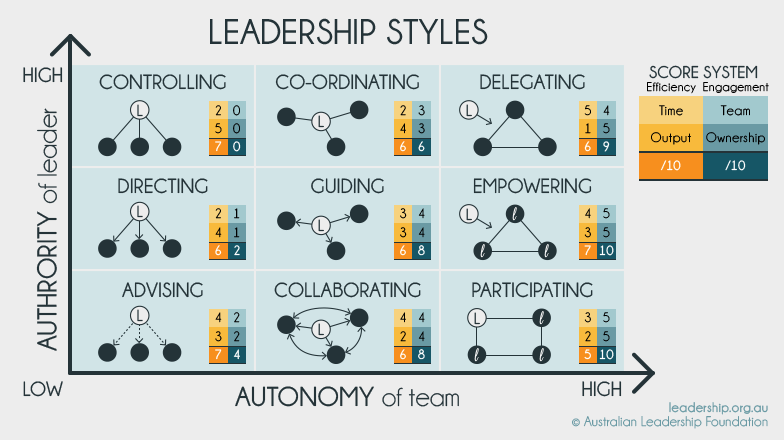SESSION 19
ORGANIZATIONAL LEADERSHIP MODELS
There are a number of different theories of leadership.
We will consider a few and identify how we fit into their definitions.
Start by watching a discussion on leadership being a choice
"Leadership is not a talent or a gift. It's a choice. It's not complex, but it's very hard." General Stanley McChrystal explains to a packed auditorium of 600 at Stanford Graduate School of Business. McChrystal shares his perspective on leadership and influence discussing the importance of understanding culture, leading by example, building trust, and creating a common goal within a team.
back to top
Then read this one

To prepare yourselves for the session take the What's Your Leadership Style? quiz and come prepared to discuss your results
back to top
You don't have to read these unless you wish to,
but we might touch upon them in conversation

Rooke, D., & Torbert, W. R. (2005, Apr). 7 transformations of leadership. Harvard Business Review, 66-76.
Most developmental psychologists agree that what differentiates one leader from another is not so much philosophy of leadership, personality, or style of management. Rather, it's internal "action logic"--how a leader interprets the surroundings and reacts when his or her power or safety is challenged. Relatively few leaders, however, try to understand their action logic, and fewer still have explored the possibility of changing it.
They should, because leaders who undertake this voyage of personal understanding and development can transform not only their own capabilities but also those of their companies. The authors draw on 25 years of consulting experience and collaboration with psychologist Susanne Cook-Greuter to present a typology of leadership based on the way managers personally make sense of the world around them. Rooke and Torbert classify leaders into seven distinct action/logic categories:- the first three associated with below-average performance, the latter four with medium to high performance.
- Opportunists,
- Diplomats,
- Experts,
- Achievers,
- Individualists,
- Strategists, and
- Alchemists
These leadership styles are not fixed, the authors say, and executives who are willing to work at developing themselves and becoming more self-aware can almost certainly move toward one of the more effective action logics ... Corporations that help their executives and leadership teams to examine their action logics can reap rich rewards.
back to top
things we'll talk about
- we'll consider leadership functions within organizational structures. contrast the difference between the three Lewin styles and the multiple Rooke and Torbert styles.
- what are the strengths and weaknesses of the different leadership styles?
- plan to discuss the impact of leadership on the success and/or failure of organizations
- can an organization be successful without inspirational leadership? if so, how? if not, why?

back to top
something to take away
Sure Thing
And sometimes you cannot necessarily place the locale of a musician because he is all over the place. St. Germain is one such example. A comment from his Last.fm entry.
St. Germain is the stage name of Ludovic Navarre, a French musician whose style merges jazzy house music with acid jazz. His album Boulevard was released in July 1995 and has sold over 300,000 copies worldwide. His United States debut, Tourist, was released in 2000 and sold 200,000 copies. Bob Marley, Toots and the Maytals, Miles Davis and Kool & The Gang are among Ludovic's early influences. He composed his first work under the name of Sub System with friend Guy Rabiller. He has released EPs under a number of aliases, among them Deepside, LN's, Modus Vivendi, Hexagone, Nuages and Soofle.
By the way, he is on one of the keyboards.